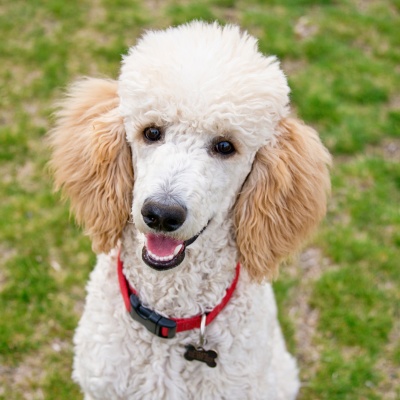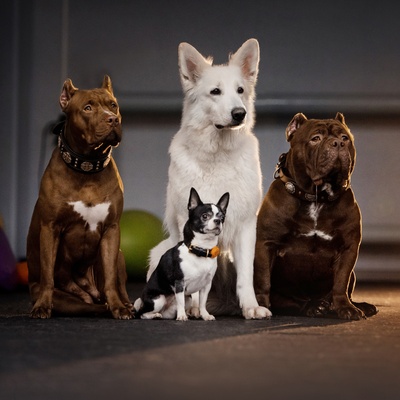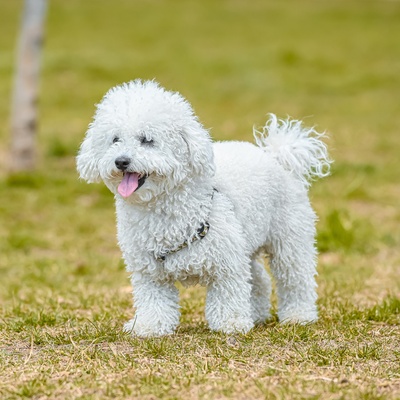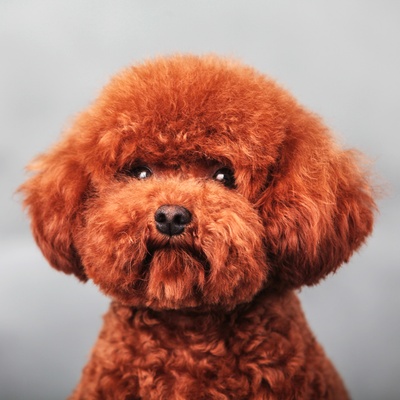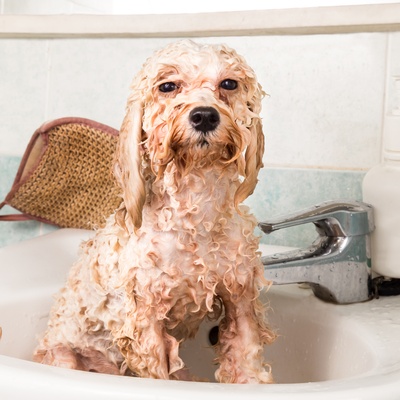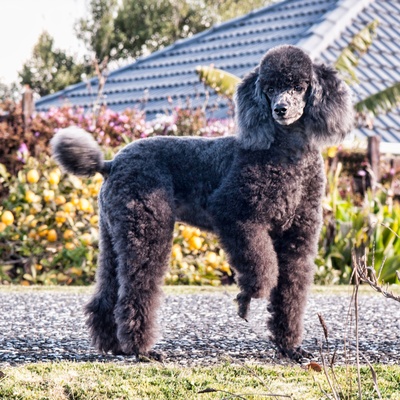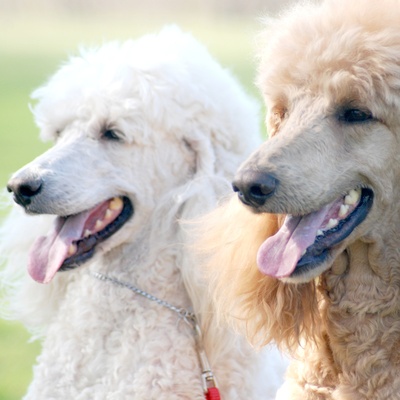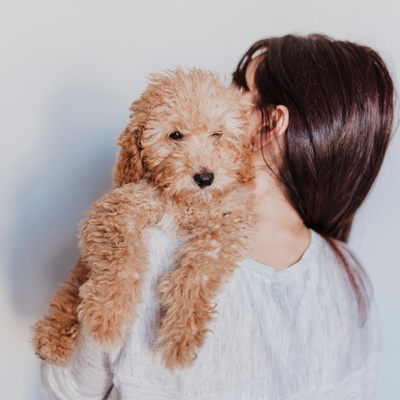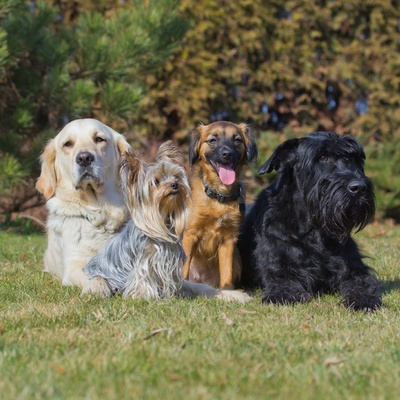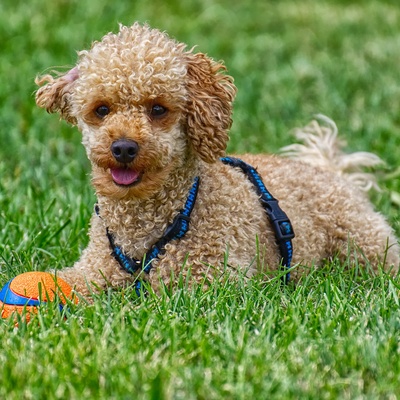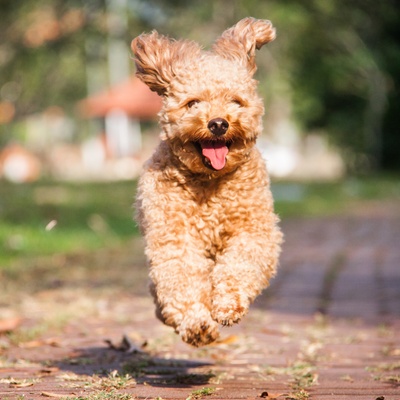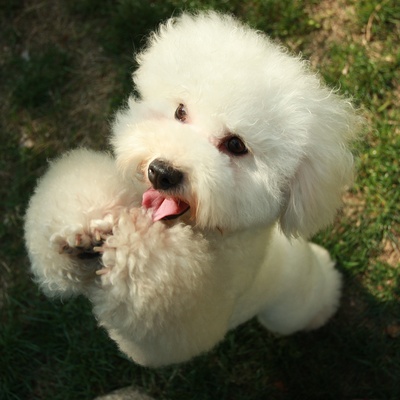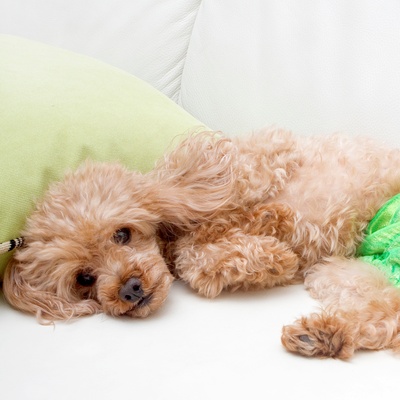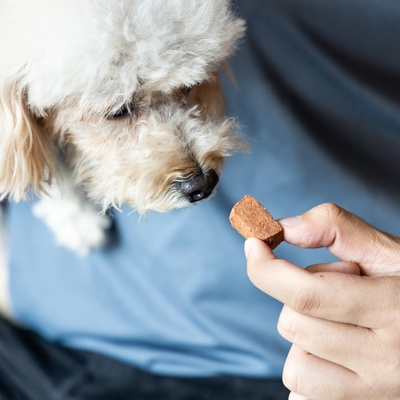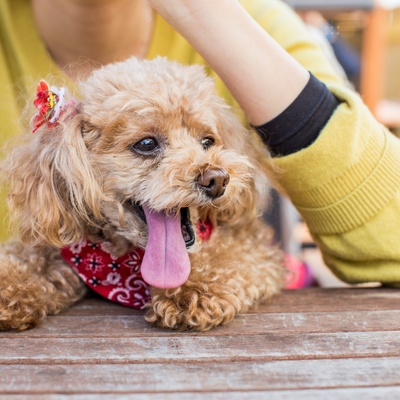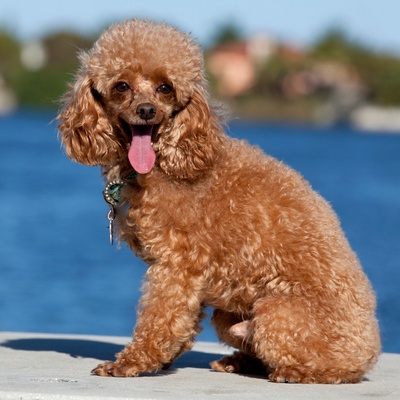Introducing the Poodle
Discover all there is to know about the Poodle: its characteristics, behavior, training, and its cost.
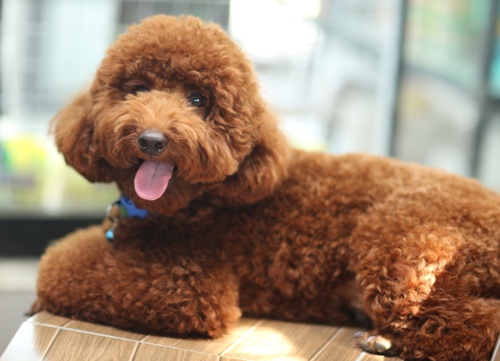
Discover all there is to know about the Poodle: its characteristics, behavior, training, and its cost.
Originating from Germany and refined in France, the Poodle is renowned for its intelligence and graceful demeanor. Initially bred for retrieving waterfowl, it has become one of the most versatile and beloved dog breeds. Available in Standard, Miniature, and Toy sizes, Poodles fit into a variety of lifestyles, making them ideal for many families.
Poodles stand out for their trainable nature and sharp minds, excelling in obedience and agility. They are deeply loyal, showcasing a gentle and loving nature toward their families. Known for their sociability, Poodles are friendly, polite, and enjoy the company of humans and pets alike, solidifying their status as cherished companions.
This section outlines the unique features of the Poodle breed.
Poodles, part of the Utility group, are renowned for their intelligence and versatility in roles beyond hunting and herding. They excel in companionship, assistance, and performance due to their adaptable nature and remarkable aptitude.
Poodles are available in three sizes: Standard (over 15 inches), Miniature (10 to 15 inches), and Toy (under 10 inches). This variety makes them suitable for different family sizes and living environments.
The Poodle sports a distinctive curly coat that can vary in length. Their fur is dense and wooly, requiring regular grooming to maintain its characteristic appearance and prevent mats.
Poodle coats come in a wide variety of colors including but not limited to black, white, apricot, and silver. The breed is known for its striking solid colors that can range from deep shades to more muted tones.
Poodles are adaptable and can thrive in various living environments, from apartments to large homes with yards. Their size variation makes them suitable for different types of households, though they all appreciate and require regular exercise.
Poodles are highly sociable, friendly, and great with children and other animals. They are known for their affectionate nature and enjoy being part of a family, demonstrating loyalty and a desire to please.
Generally, Poodles are a healthy breed. However, they can be predisposed to certain genetic conditions, such as hip dysplasia and eye disorders. Regular health check-ups and a well-maintained lifestyle can help prevent or manage these issues.
Poodles are intelligent and trainable, responding well to positive reinforcement and excelling in obedience and agility due to their quick learning ability. Patience and consistency are crucial in maximizing their potential.
We can help!
Every dog has its own character, and so do you. Making the right choice will ensure his well-being and yours.
Take our quiz to find out which breed is right for you, based on your personality, lifestyle, location and many other criteria.
Don't wait any longer and take the quiz to find out the answer!
Poodles are distinguished by their elegant stature, sophisticated appearance, and unique coat that lends itself to various styles, with their poised physique and expressive features like eyes and a distinct muzzle enhancing their dignified look.
Poodles are unique in that they come in three distinct sizes: Standard, Miniature, and Toy. Standard Poodles, the largest of the breed, typically stand over 15 inches tall at the shoulder for both females and males. Miniature Poodles measure 10 to 15 inches, while Toy Poodles are 10 inches or under.
In terms of weight, Standard Poodles can weigh between 40 to 70 pounds, depending on their height and gender. Miniature Poodles weigh between 10 to 15 pounds, and Toy Poodles are even lighter, usually not weighing more than 6 to 9 pounds.
Poodle puppies grow quickly in their first year, with most reaching their full size by their first birthday. However, their coats continue to develop and mature, often not reaching their full luxuriousness until they are around 2 years old. This growth pattern showcases the breed's swift transition from playful puppies to graceful adults.
Poodles boast a unique, curly coat that sets them apart from other dog breeds. Their fur is dense and wooly, capable of being styled in various ways for both practical purposes and dog shows. Unlike other breeds, the Poodle's coat does not have a "shedding season" but rather grows continuously, requiring regular grooming to prevent mats and tangles.
Poodles come in a wide range of colors, including but not limited to black, white, apricot, silver, and chocolate. This diversity allows for a fascinating variety within the breed, making each Poodle distinct in its appearance.
The coat of a Poodle is both a hallmark of the breed and a significant commitment. Their fur's length and density mean that Poodles do not shed in the traditional sense; however, their hair does fall out and can become entangled in the surrounding curls. To prevent matting and ensure the coat remains healthy and beautiful, regular brushing is essential. Poodles typically require professional grooming every 3 to 6 weeks to trim their hair, clean their ears, and attend to other hygiene needs. Additionally, bathing a Poodle should be done with care to maintain their skin's natural oils, usually every 3 to 4 weeks depending on the dog's lifestyle and level of outdoor activity.
The Poodle is the epitome of balance and proportion in the canine world. With a dignified and elegant posture, this breed exhibits a refined silhouette that is both athletic and graceful. The head of a Poodle is distinct, featuring a well-defined shape with a slight rounding at the crown. The eyes, often a dark, shimmering hue, are oval-shaped and convey an expression of alert intelligence and keen curiosity. Positioned close to the head, the ears hang down and are long, framing the face with a soft elegance.
The body of the Poodle boasts a sturdy and muscular build, indicative of the breed's athletic capabilities, while maintaining a slender and sophisticated appearance. This combination of physical attributes contributes to the Poodle's reputation as a versatile and adaptable breed, capable of excelling in various activities while also serving as a loyal and elegant companion.
Poodles are known for their loyal, intelligent, and affectionate temperament. They are highly adaptable, making them excellent companions for a wide range of lifestyles.
There are over 340 recognized dog breeds, divided into 10 distinct groups according to the Fédération Cynologique Internationale (FCI). Poodles fall into Group 9: Companion and Toy Dogs, which includes breeds known for their companionship and ability to live closely with humans.
This group encompasses a variety of breeds, from the small Chihuahua to the larger French Bulldog, all sharing common traits such as sociability, intelligence, and adaptability. Poodles, in particular, stand out within this group for their remarkable intelligence, trainable nature, and affectionate demeanor. They were originally bred for retrieving but have easily transitioned into roles as diverse as circus performers and therapy dogs due to their docile and gentle nature.
The primary role of the Poodle has evolved from a working dog to a companion animal. However, their agility, obedience, and ability to learn quickly make them versatile dogs capable of excelling in various activities beyond companionship.
Poodles are distinguished by their sophisticated and keen behavior. These intelligent dogs are not only alert and active but also highly affectionate, often forming a strong bond with their owners. They thrive on attention and interaction, making them ideal pets for those who can provide an engaged and loving home environment.
The presence of an attentive owner is crucial for a Poodle's well-being, as they require mental stimulation to keep their sharp minds active and to prevent boredom.
Poodles exhibit remarkable sociability and generosity, making them excellent companions for families and individuals alike. They are known for their friendly nature, getting along well with humans, including strangers, which makes them poor guard dogs but excellent social pets. Poodles are particularly good with children, displaying patience and gentleness that make them suitable for families.
It's essential to nurture their sociability from a young age through socialization and training to ensure they grow into well-rounded and adaptable adult dogs. This early training helps Poodles to confidently navigate a variety of social situations, ensuring they remain the amiable and outgoing companions they are known for.
Take the test and find out the dog breed that matches your personality and lifestyle.
Poodles are remarkably adaptable, capable of thriving in a variety of living situations, from cozy apartments to spacious houses, and in both urban and rural settings. The key to their happiness, however, lies not in the size of their home but in the quality of attention and engagement they receive from their owners. Poodles are social animals that need interaction and mental stimulation; thus, they benefit greatly from owners who are present and involved.
Poodles are energetic and curious, requiring regular physical activity in outdoor spaces for exploration and play. While a large yard isn't essential, frequent park visits or outdoor play, along with their love for swimming and water activities, are vital for their physical and mental health.
Poodles are synonymous with superior intelligence and an impressive capacity for learning, making them one of the easiest breeds to train. Their keen minds grasp commands quickly, and they enjoy the mental stimulation that training provides.
However, their intelligence also means that they can become bored with repetitive tasks, so it's essential to keep training sessions engaging and varied. Incorporating play into training can be particularly effective. Given their propensity for exploration and the occasional bout of wanderlust, outfitting a Poodle with a GPS collar is a prudent measure to ensure their safety and prevent any potential losses or escapes.
Poodles possess remarkable listening qualities, making them excellent companions for those willing to invest time in training. Their unique training characteristics include a desire to please their owners and a sensitivity to tone of voice and body language, which can be leveraged to enhance learning outcomes.
Training a Poodle requires consistency, patience, and a positive reinforcement approach, as they respond well to rewards and praise. Their versatility and eagerness to learn make them adept at a variety of tasks and activities, from basic obedience to complex tricks and agility training.
Poodles, typically enjoying good health and longevity, require daily care including regular grooming, a balanced diet, and sufficient exercise to prevent common diseases and maintain overall health. Proper attention to these aspects is essential for their well-being.
Overall, Poodles are a robust breed with a relatively good health record. However, they are predisposed to certain genetic conditions, such as hip dysplasia, certain eye disorders, and von Willebrand's disease, a type of bleeding disorder. They may also be prone to skin issues, including allergies that can lead to scratching and discomfort. Ear infections can occur, particularly in varieties with very fluffy ears, due to moisture buildup.
The typical lifespan of a Poodle varies by size: Standard Poodles often live 12 to 15 years, Miniatures around 14 to 16 years, and Toys can reach 16 years or more with proper care.
Regular veterinary visits are essential for keeping your Poodle healthy throughout its life. Vaccinations, deworming, and parasite prevention are fundamental aspects of their health care routine recommended by vets. Daily grooming tasks include brushing their coat to prevent mats, cleaning their ears to avoid infections, and dental care to ward off tartar buildup. Nails should be trimmed regularly to prevent discomfort and walking issues.
Although Poodles are considered more hypoallergenic due to their hair-like coat, which sheds less dander and hair, it's important to consult with a veterinarian for specific allergies and to establish a tailored care plan.
Poodles, like all dog breeds, require a balanced diet that caters to their unique nutritional needs to maintain their health, energy, and well-being. A diet rich in proteins and essential vitamins is crucial for supporting their active lifestyle and luxurious coat. Premium kibble, specifically formulated for Poodles, offers a solid foundation for their daily dietary needs, ensuring they receive the right balance of nutrients.
For those Poodles with higher activity levels or additional protein requirements, supplementing their diet with lean cuts of white and red meat can provide an excellent protein boost while keeping fat intake in check. It's important to monitor the amount of supplemental meat to avoid excessive caloric intake, particularly for less active dogs, to prevent weight gain and ensure optimal health.
Poodles are favored for their intelligence, versatility, and hypoallergenic coats, with a variety of breeders offering Standard to Toy types. Prospective owners should carefully evaluate their ability to commit to the breed's care and the suitability of their home environment before adopting.
Before bringing a Poodle into your home, it's crucial to make an informed decision. Choosing a reputable breeder is essential; a visit to the breeder's premises allows you to observe the living conditions and behavior of the dogs, ensuring they are healthy and well-cared for. Inquire about the health of the puppy and its parents, including any genetic conditions known in their lineage.
Lastly, you must have your dog microchipped by the age of 8 weeks old and have their details registered on a relevant database like Petlog or Animal Tracker. This is a legal requirement in Great Britain, with a potential £500 fine for non-compliance. Microchipping can be done by your vet for a small fee, or for free at any Blue Cross center.
The cost of acquiring a Poodle puppy varies widely based on factors such as the dog's size, lineage, pedigree, and the breeder's reputation. Prices can range significantly, with Toy and Miniature Poodles generally costing from
to
, and Standard Poodles sometimes fetching higher prices due to their size and breeding complexities.
Beyond the initial cost, maintaining a Poodle involves ongoing expenses for food, grooming, veterinary care, and other necessities, potentially amounting to an estimated annual cost of
to
. This breed, known for its long lifespan, requires a long-term commitment to ensure their health and happiness.
Choosing a dog that matches your personality and lifestyle will ensure your well-being and his!
